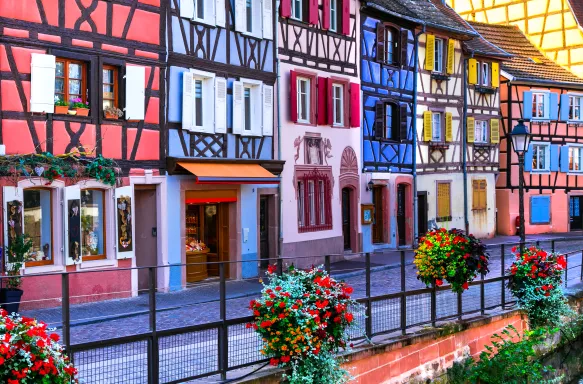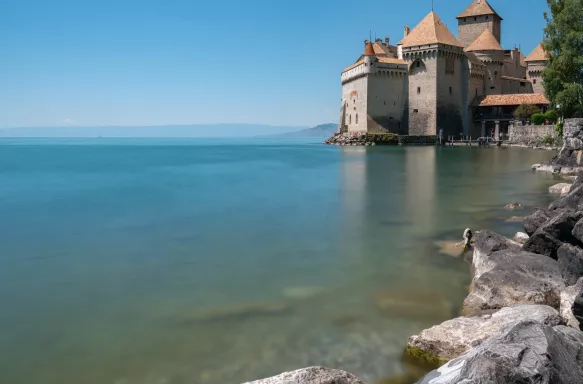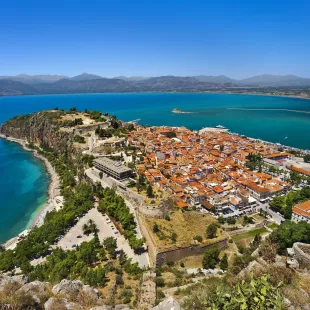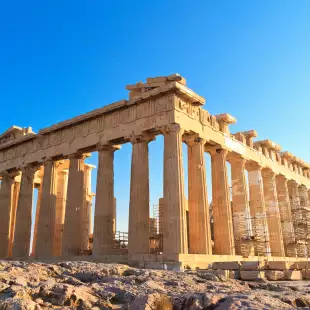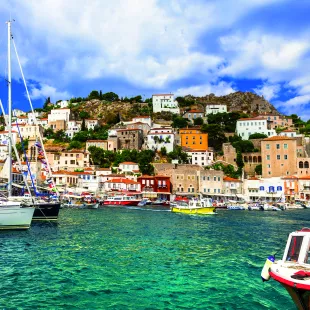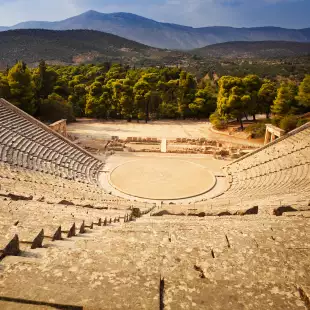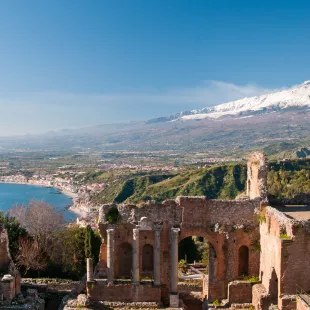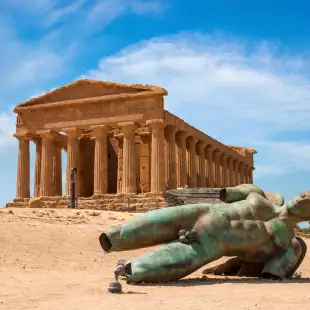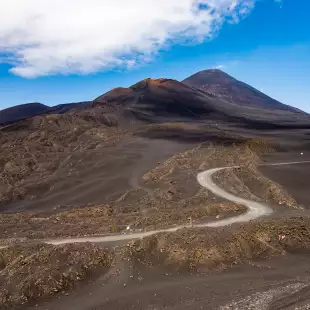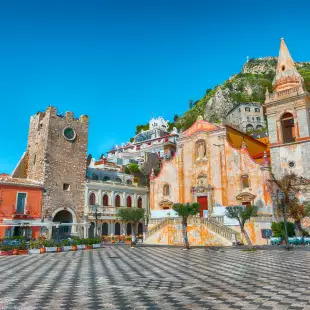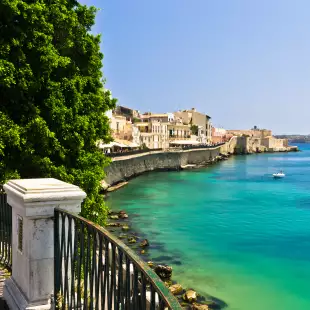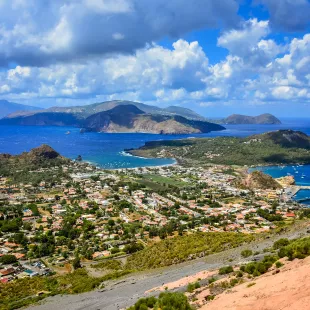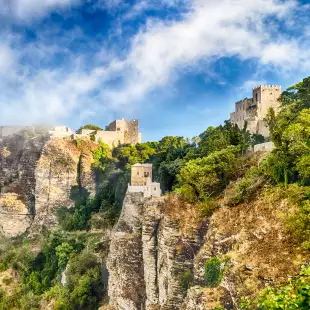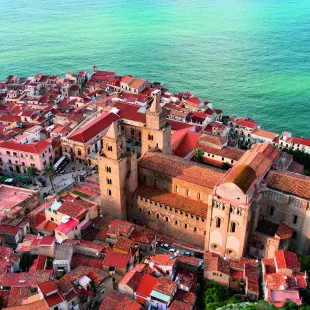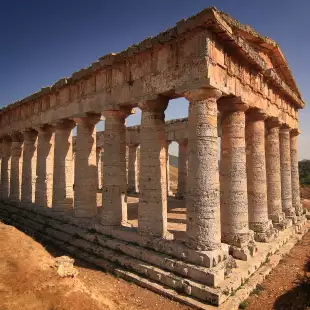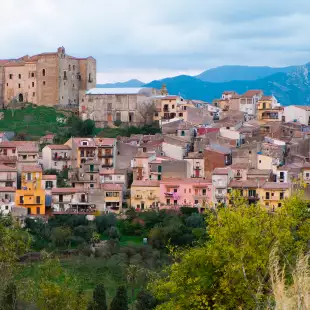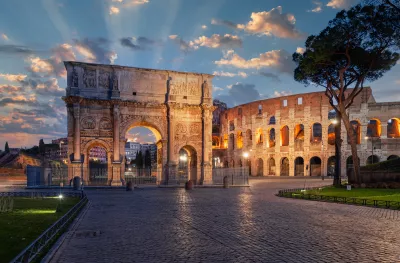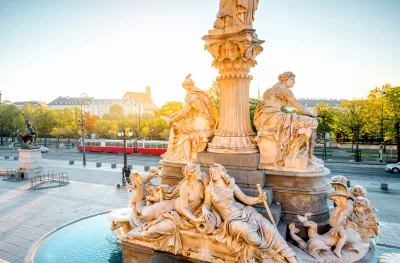Destinations that inspired myths and fairytales
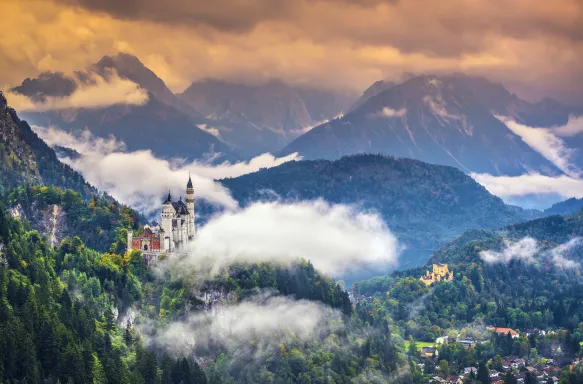
If stories set your curiosity aflame, good news, you can probably visit the destinations that inspired them. Are you a geek for Greek mythology? Chances are there's a real spot in the Mediterranean that inspired your favourite stories - and it's just waiting for you to visit. And, of course, if you're a lifelong fan of fairytales, you'll know that many of the beloved Disney animations were inspired by real towns and castles throughout Europe - the Alsace region in France was the inspiration for the town in Beauty and the Beast (1991), the castle in Cinderella (1950) was famously inspired by Neuschwanstein Castle, and Chillon Castle was the inspiration for the castle in The Little Mermaid (1992) just to name a few. But they aren’t the only ones. Here are some of our favourite destinations to visit and the myths and legends that make them all the more magical.
Hamelin, Germany
Many know the story of the Pied Piper. Hired by the mayor to get rid of a rat infestation, he lured the children away as well when the town refused to pay him. But did you know that the chilling Brothers Grimm fairytale can be traced all the way back to the Middle Ages? According to the legend, in the small town of Hamelin in Lower Saxony, many children disappeared at the same time without a trace. No one knew where, but everyone suspected the rat catcher.
Today the town retains its fairytale charm with half-timber houses, cobblestone roads and a colourful marketplace. They've leant into the legend with a free play performed every Sunday throughout summer and a bespoke Glockenspiel on the gables of the Hochzeithaus (Wedding House) which shows first the Piper leading a pack of rats and then a scarier Piper leading all but two children. There's also a museum, which details the history of Hamelin and the Pied Piper's House - which still bears an inscription on the side of the building mentioning the loss of the Hamelin children in 1284 - making it the oldest version of the tale. It talks about how 130 children were kidnapped on 26th June 1284 by a rat catcher with a pipe.
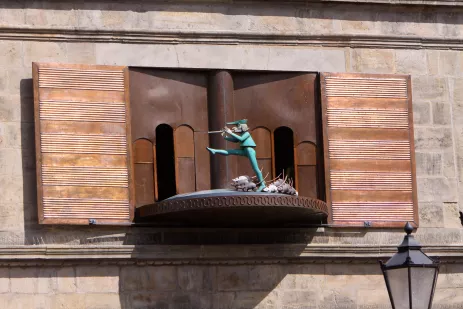
Rhine River Valley, Germany
This area of the Rhine River is well-known for its beauty, but it's not just the views that are said to be bewitching. As the legend goes, many boats lie at the bottom of a deep but narrow part of the Rhine thanks to Lorelie - a woman of such beauty that she would cause sailors to wreck their ships in the dangerous currents along the jagged shoreline. Was she innocent? Or was she a siren intentionally luring sailors to their doom? There are a few conflicting answers but either way, the story of Lorelei has enraptured many Germans for hundreds of years - it's even immortalised in a poem, "The Lorelei" by Heinrich Heine.
As you travel up the Rhine on our river cruises, you may spot the Lorelei (or Loreley), a steep 132 metre high slate rock on the right bank of the river near Sankt Goarshausen - but don't worry, the mythical siren hasn't been spotted in centuries.
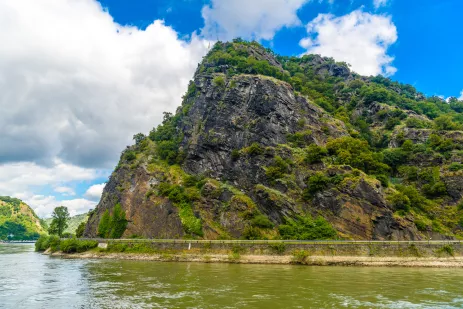
Athens, Greece
Greece is a land of myth and legend. Practically wherever you go, the land is imbued with millennia of history. But for those who want to tread in the footsteps of the gods and Greek heroes made famous by the classics, none is more famous, or well-visited than Athens.
As the story of the city goes: Two gods were interested in controlling Athens - the goddess of wisdom and war, Athena, and the god of the sea, storms, earthquakes and horses, Poseidon. To decide the King of Athens asked the gods for a gift that would be of use to the people of Athens. Poseidon created a saltwater well while Athena created an olive tree. The King of Athens chose Athena, and so Athens was named after her.
There are many other myths associated with the city - including having its own entrance to the Underworld through Eleusis, just 30km away - and walking through the ruins of the Acropolis you can truly get a sense of what was like over 5000 years ago.

Delphi, Greece
Legendary home of the Oracle of Delphi - arguably one of Ancient Greek Religion's most powerful women. According to the myths, the oracle received some of the most famous names in ancient history who sought her wisdom, including Alexander the Great, Croesus of Lydia, King Midas and Emperor Hadrian - leader of the Roman Empire.
While no Oracle resides here now (we checked), Delphi is still worth a visit. Here you can explore the monuments and ruins dedicated to Apollo set amongst the cliffs of Mount Parnassus and lofty crags and enjoy views of a silvery sea of olive groves.
Crete, Greece
According to the myth, Knossos in Crete lies on top of a great labyrinth, where a Minotaur was kept - the child of the King's wife and a white bull sent by Poseidon. The Cretan King demanded seven young men and seven young maidens from Athens as a tax – they were then fed to the Minotaur. Today, you can still visit the ruins of the imposing Minoan Palace, wander the complex and see the throne room where the legendary King Minos sat. And thanks to Theseus - who slayed the monster in the classic tale - there’s no risk of running into a Minotaur.
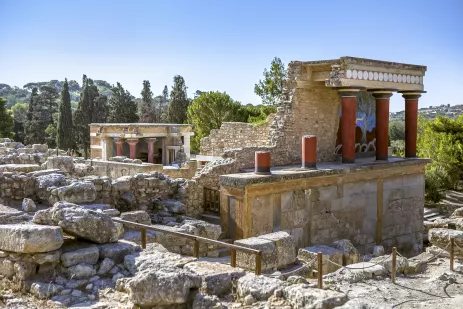
Sicily, Italy
Sticking with Greek Mythology, Sicily was said to be home to the Cyclopes. In most stories, cyclopes were the sons of Poseidon - they were huge and extremely strong with one giant eye. (Although Homer never explicitly says they're one-eyed, they must have been, otherwise the story of Odysseus blinding Polyphemus wouldn't make sense.) Today, everyone in Sicily is fairly average-sized (or at least the ones we've met). If you’re going on the hunt for a cyclops, you should start at the Riviera dei Ciclopi (Riviera of Cyclops), the coastline stretching North of Catania overlooking the Ionian Sea – but even without the myths, Sicily is a wonderful holiday destination with plenty to explore. You can visit Sicily on several of our holidays.
Transylvania, Romania
Made famous by Bram Stoker - who had never even visited Romania - Transylvania is now synonymous with Dracula. While we know the toothy vampire is a work of fiction, the Irish Novelist did loosely base his character on a 15th-century prince with a bloody history, Vlad the Impaler, a famously brutal and sadistic leader known for brutally torturing his foes. Today, you can still visit Bran Castle - the fictional home of the titular character - an imposing fortress built into the mountainside dividing Transylvania from the region of Walachia, surrounded by dense forest. While at night it may look like a lair fit for the prince of darkness, in the daylight it looks more fit for a queen, which it was. Queen Marie of Romania, the eccentric Granddaughter of England's Queen Victoria, called the 57-room chateau home from 1920 to 1938.
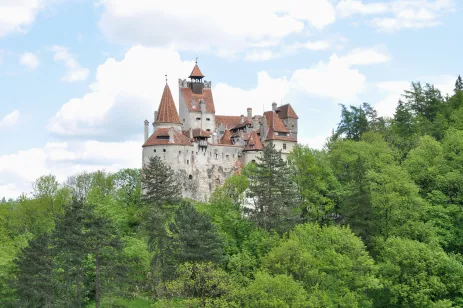
Prague, Czech Republic
One of the most notable creatures from Czech and Jewish folklore is the Golem – a legendary figure that once stalked the crooked alleyways and dark corners of Prague’s Jewish ghetto in the 16th century. The story goes that renowned Rabbi Low was seeking a way to protect the Jewish people of Prague during unsettled times. According to Jewish Cabalistic tradition, someone knowledgeable and faithful enough to know the exact sequence of God’s 27 letters can create a human-like being and bring it to life by placing a parchment (or a shem) with the letters sequence inside its head. One Friday, the Rabbi forgot to remove the parchment for the Sabbath and the Golem started to destroy the ghetto as it had no instructions. Eventually the Golem was stopped and hid, as it was too dangerous to leave it alive.
Today, the city’s unique atmosphere enchants visitors with the sights and sounds of a bygone era. Between Old Town and the Vltava River, you can still find the Jewish Ghetto with six synagogues and the Jewish Museum – which is surprisingly well furnished thanks to the Hitlers haunting intention to preserve the Jewish Quatre as a “Museum of an Extinct Race” during the Nazi occupation, the Nazi’s even plundered Jewish artefacts from other occupied territories to form part of the museum.
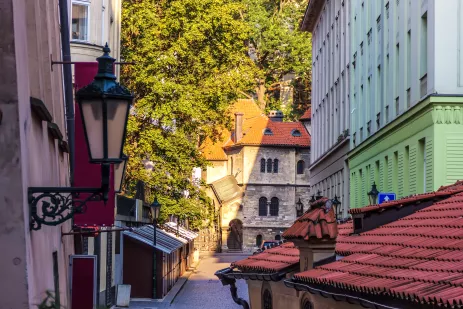
Troy, Turkey
One of the most well-known war stories in Greek Mythology is that of the Trojan War. The Achaean alliance waged war against the city of Troy for 10 years, claiming the lives of some of Greek mythology's greatest heroes before Odysseus devised the ruse of the Trojan Horse. Today, you can visit the ruins of Troy, which resembles an overgrown archaeological dig. Here, you can see the remnants of the fortifications of the east wall gate and tower, the site of the temple of Athena and other ancient structures.
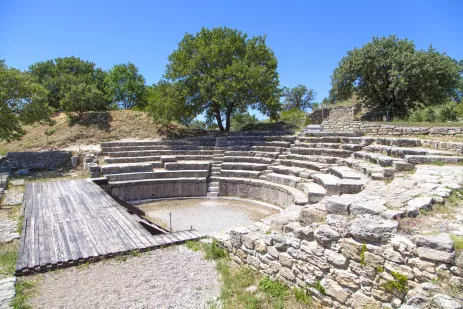
The Nile, Egypt
The Nile was considered a gift from the gods and is equated with life itself in Egypt - even the three seasons of the Egyptian calendar are determined by the river. It's also instrumental in the stories of Osiris and Seth. Re, the sun God, appointed Osiris as King of Egypt. He was good and wise and taught the people to grow, nurture crops, and make beer, bread and wine. However, his brother, Seth, envied him so he wrapped him in a box, sealed it with molten lead and threw it into the Nile where it floated down to the sea. Osiris became the god of the dead in the afterlife or underworld. Isis - Osiris's wife and sister - found his body, so Seth cut the body into 14 bits and scattered them across Egypt.
Sailing down the Nile transports you back to the time of the pharaohs. There are so many iconic landmarks to see along the way, from the temple of Abu Simbel in Aswan to the Valley of the Kings and the Luxor Temple to the Pyramids of Giza and the Great Sphinx. Home to countless UNESCO-listed sites and two of the Seven Wonders of the Ancient World.
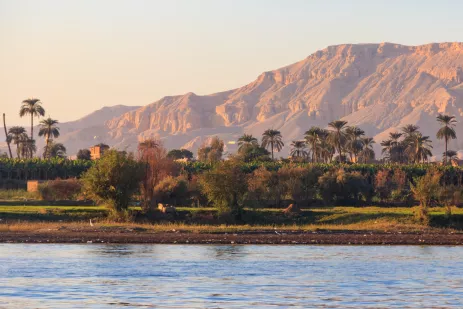
Machu Picchu
There's a lot still unknown about Machu Picchu, which was hidden by the dense tropical forest for centuries. Some say the city was built in a single night by the god Viracrocha, who used his staff to create the buildings and terraces out of the mountainsides. Beneath the city is said to be the secret city, known as Paitit, where the Incas are said to have hidden their treasures from Spanish Conquistadors. When visiting Machu Picchu, you'll find plenty to interest you, from the city's archaeological sites significance to the various scientific and religious practises of the Incans. And amazingly, many believe we've only scratched the surface.
We visit Machu Picchu on our Peru tours.

Did your favourite myth or fairytale make the list? If not, find out if you can still travel there with Riviera Travel.
